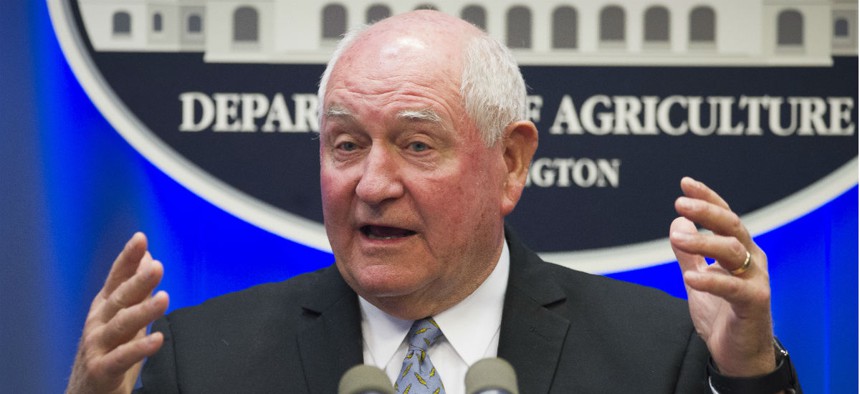Agriculture Department Staff Given Marching Orders for Controversial Move
Despite legislated delay, research offices prepare to relocate most employees.
Hundreds of employees of two key Agriculture Department research offices on Tuesday learned that they’re on the list to be transferred outside of Washington as part of Secretary Sonny Perdue’s disputed plan to move operations closer to farm industry stakeholders.
At the Economic Research Service a list was circulated showing the job titles and descriptions (but not the names) of 76 positions that will remain in the national capital region, leaving the rest of that office’s 350 employees to assume their job will move to the still-unspecified new location.
The “stay/go” list, obtained by Government Executive, was supplemented during a staff meeting with names, according to a source who spoke on condition of anonymity. This employee called the steps—for which there is still no timetable-- “a disaster” that will “split up operational groups that work together. It will engender departures,” the employee added, noting that supervisors are being separated from their underlings.
Asked for comment, a department spokeswoman confirmed the meetings and said similar steps were taken at the 350-employee National Institute of Food and Agriculture. “As part of our vision to make USDA the most efficient, most effective and most customer-focused department in the federal government, USDA recently shared information with NIFA and ERS employees describing the proposed functionality of each agency which has been determined to remain within the National Capital Region versus the functionality that will be re-located,” the statement said. “Currently, USDA’s highest priority regarding the relocation is communicating with our employees. As there is additional information to share with the public, USDA remains committed to doing so.”
The location of the new sites is being determined by a bidding process in which some 136 localities, nonprofits and companies are participating.
Perdue’s plan, however, has drawn fierce opposition from academics and many in Congress, and his authority to continue pursuing the plan is in question. In late January, a week after President Trump signed an omnibus spending bill that ended the 35-day partial government shutdown, agricultural appropriators in the House and Senate released “explanatory statements” to earlier committee reports expressing concerns about “unknown costs” of the moves, which it called “premature” pending a cost-benefit analysis.
“In submitting the fiscal year 2020 budget justification, the department is directed to include all cost estimates for the proposed move of the two agencies, as well as a detailed analysis of any research benefits of their relocation,” the Senate statement read. “There is an expectation that this process will be followed in the future for any other potential proposed agency relocations by the department.”
In addition, the statements assert that, “The bill supports an indefinite delay in the proposed transfer of ERS to the Office of the Chief Economist. At this time, the bill finds it appropriate for ERS to remain under the Research, Education and Economics mission area.”
In February, a group of Democrats led by Rep. Chellie Pingree, D-Maine, re-introduced earlier legislation (H.R. 1221) that would block the moves.
The explanatory statements and the bill were cheered by the American Statistical Association, which since last August has been mobilizing researchers to oppose the moves, which they see as arbitrary and a hindrance to professional operations centered in Washington that will cause an exodus of experienced employees.
Association Executive Director Ron Wasserstein said in a statement to Government Executive, “This latest action reinforces the need for Congress to prevent this counterproductive upheaval of the USDA research arm. USDA promised to take seriously signals from Congress and the input from stakeholders but has not done so. This is unfortunately no surprise, since USDA did not consult Congress or their partners and experts in the agricultural and food research community in making these plans last summer.”
The department spokesman did not address the questions surrounding the intent of Congress in delaying the moves.
NEXT STORY: What Did You Learn From Your Worst Boss Ever?




